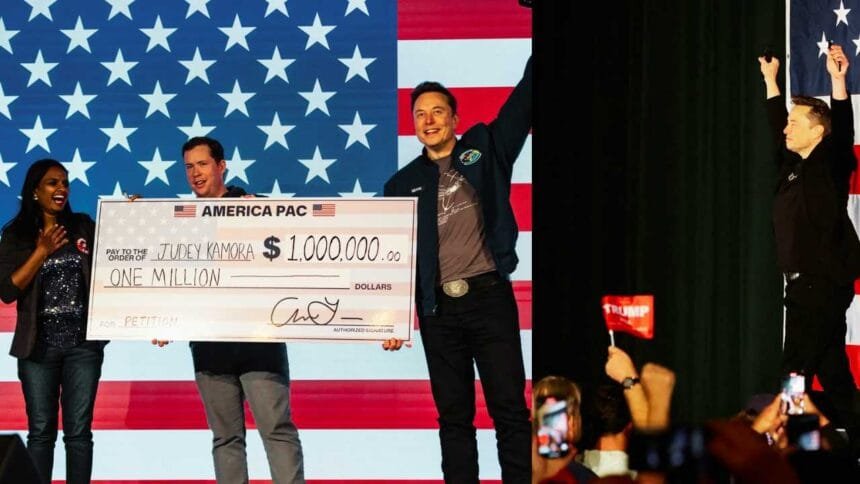Elon Musk, the billionaire founder of Tesla and SpaceX, has been ordered by a federal judge in Texas to face a lawsuit accusing him of running an illegal $1 million election lottery during the 2024 presidential campaign.
The ruling came on Wednesday from U.S. District Judge Robert Pitman, who said Arizona voter Jacqueline McAferty had presented a plausible case in her proposed class action lawsuit.
McAferty claims Musk and his political action committee, America PAC, tricked voters in seven battleground states into signing a petition by promising them a chance to win $1 million each day leading up to the election.
According to the lawsuit, participants were told that winners would be randomly selected, as in a traditional lottery, but in reality voters never had a legitimate chance to collect the money.
To enter, they were required to provide personal information including names, addresses, email addresses, and phone numbers.
McAferty argues that this information carried significant value for political data brokers and that Musk and America PAC used the promise of a massive payout as a way to harvest voter data during a critical point in the campaign.
Musk, who founded America PAC to support Donald Trump’s successful 2024 presidential run, has denied the claims and sought to have the case dismissed.
His defense argued that the program was not an illegal lottery because the language used stated recipients would be “selected to earn” the money as PAC spokespeople rather than winning it as a prize.
However, Judge Pitman pointed to other promotional statements made by Musk’s team suggesting participants could “win” or be “awarded” the money, which could have reasonably led voters to believe they were entering a random lottery.
Pitman wrote that it is plausible the plaintiff justifiably relied on those statements, even if Musk and his PAC had different intentions.
The lawsuit was filed on Election Day, November 5, 2024, while just a day earlier a Philadelphia judge refused to block Musk’s giveaway, ruling that local prosecutors had not shown it to be illegal under Pennsylvania law.
Despite Musk’s argument that voters did not suffer harm by providing their personal data, Judge Pitman said expert testimony could establish the potential monetary value of the information gathered, particularly in politically crucial swing states.
Musk is a Texas resident and runs several businesses headquartered in Austin, including Tesla. The case, formally known as McAferty v.
Musk et al, will now proceed in the U.S. District Court for the Western District of Texas. While Musk and his legal team have not yet responded publicly to the latest ruling, the outcome of this case could carry significant implications for how billionaires, political organizations, and tech-driven campaigns use giveaways and data collection in future U.S. elections.
This lawsuit adds to Musk’s growing list of legal challenges and controversies, raising fresh questions about the intersection of money, influence, and political strategy in America.
If successful, the class action could involve thousands of voters who participated in the petition drive across multiple states, making it one of the most closely watched political lawsuits of the 2024 election aftermath.
Source: Reuters



